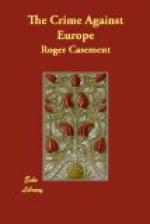Maurice Fitzgerald, the outlawed claimant to the Earldom of Desmond, wrote to Philip II, from Lisbon on September 4th, 1593:
“We have thought it right to implore your Majesty to send the aid you will think fit and with it to send us (the Irish refugees in the Peninsula) to defend and uphold the same undertaking; for we hope, with God’s help Your Majesty will be victorious and conquer and hold as your own the kingdom of Ireland.—We trust in God that Your Majesty and the Council will weigh well the advantages that will ensue to Christendom from this enterprise—since the opportunity is so good and the cause so just and weighty, and the undertaking so easily completed.”
The history of human freedom is written in letters of blood. It is the law of God. No people who clutch to safety, who shun death are worthy of freedom.
The dead who die for Ireland are the only live men in a free Ireland. The rest are cattle. Freedom is kept alive in man’s blood only by shedding of that blood. It was not an act of a foreign Parliament they were seeking, those splendid “scorners of death,” the lads and young men of Mayo, who awaited with a fearless joy the advance of the English army fresh from the defeat of Humbert in 1798. Then, if ever, Irishmen might have run from a victorious and pitiless enemy who, having captured the French General and murdered in cold blood the seven hundred Killala peasants who were with his colours, were now come to Killala itself to wreak vengeance on the last stronghold of Irish rebellion.
The ill-led and half armed peasants, the last Irishmen in Ireland to stand the pitched fight for their country’s freedom, went to meet the army of England, as the Protestant Bishop, who saw them, says:—“running upon death with as little appearance of reflection or concern as if they were hastening to a show.”
The late Queen Victoria, in one of her letters to her uncle, the King of the Belgians, wrote thus of the abortive rising of fifty years later in 1848:
“There are ample means of crushing the rebellion in Ireland, and I think it is very likely to go off without any contest, which people (and I think rightly) rather regret. The Irish should receive a good lesson or they will begin again.” (Page 223, Vol. II, Queen Victoria’s letters.) Her Majesty was profoundly right. Ireland needed that lesson in 1848, as she needs it still more to-day. Had Irishmen died in 1848 as they did in 1798 Ireland would be to-day fifty years nearer to freedom. It is because a century has passed since Europe saw Ireland willing to die that to-day Europe has forgotten that she lives.
As I began this essay with a remark of Charles Lever on Germany so shall end it here with a remark of Lever on his own country, Ireland.
In a letter to a friend in Dublin, he thus put the epitaph of Europe on the grave of a generation who believed that “no human cause was worth the shedding one drop of human blood.”




